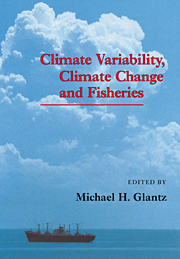Book contents
- Frontmatter
- Contents
- 1 Introduction
- 2 King crab dethroned
- 3 The rise and fall of the California sardine empire
- 4 El Niño and variability in the northeastern Pacific salmon fishery: implications for coping with climate change
- 5 The US Gulf shrimp fishery
- 6 The menhaden fishery: interactions of climate, industry, and society
- 7 Maine lobster industry
- 8 Human responses to weather-induced catastrophes in a west Mexican fishery
- 9 Irruption of sea lamprey in the upper Great Lakes: analogous events to those that may follow climate warming
- 10 North Sea herring fluctuations
- 11 Atlanto-Scandian herring: a case study
- 12 Global warming impacts on living marine resources: Anglo-Icelandic Cod Wars as an analogy
- 13 Adjustments of Polish fisheries to changes in the environment
- 14 Climate-dependent fluctuations in the Far Eastern sardine population and their impacts on fisheries and society
- 15 The Peru–Chile eastern Pacific fisheries and climatic oscillation
- 16 Climate change, the Indian Ocean tuna fishery, and empiricism
- 17 Climate variability, climate change, and fisheries: a summary
- Index
13 - Adjustments of Polish fisheries to changes in the environment
Published online by Cambridge University Press: 13 October 2009
- Frontmatter
- Contents
- 1 Introduction
- 2 King crab dethroned
- 3 The rise and fall of the California sardine empire
- 4 El Niño and variability in the northeastern Pacific salmon fishery: implications for coping with climate change
- 5 The US Gulf shrimp fishery
- 6 The menhaden fishery: interactions of climate, industry, and society
- 7 Maine lobster industry
- 8 Human responses to weather-induced catastrophes in a west Mexican fishery
- 9 Irruption of sea lamprey in the upper Great Lakes: analogous events to those that may follow climate warming
- 10 North Sea herring fluctuations
- 11 Atlanto-Scandian herring: a case study
- 12 Global warming impacts on living marine resources: Anglo-Icelandic Cod Wars as an analogy
- 13 Adjustments of Polish fisheries to changes in the environment
- 14 Climate-dependent fluctuations in the Far Eastern sardine population and their impacts on fisheries and society
- 15 The Peru–Chile eastern Pacific fisheries and climatic oscillation
- 16 Climate change, the Indian Ocean tuna fishery, and empiricism
- 17 Climate variability, climate change, and fisheries: a summary
- Index
Summary
Introduction
This assessment of some dramatic changes in the Polish fishery system has been inspired by the general assumption that a warming of the global climate may turn out to be unavoidable over the next several decades. The consequences of increasing CO emissions as a result of industrial activities are highly complex. The rise of average atmospheric temperatures by about 2–3°C could have numerous implications for marine ecosystems. Primary production and natural fish habitats will be disturbed to some, as yet unpredictable, extent. Consequently, the distribution of some living marine resources could shift, adversely affecting some fishing communities while benefiting others.
It is not yet known whether, or how, different sectors of societies will be able to respond to the environmental impacts of a global warming. Hence, the question arises whether past experiences of some fishing nations could be used to anticipate impacts on society that could take place in the future. The approach taken in this assessment is based on the concept of a case scenario. The character, qualities and range of applicability of the case-scenario approach have been comprehensively discussed for this project by, for example, Glantz (1988) and Jamieson (1988). Thus, this chapter presents basic facts regarding what actually took place in the Polish fishery. It also considers whether these facts bear any significant resemblance to those which might occur in other national fisheries as a result of global warming in the future.
- Type
- Chapter
- Information
- Climate Variability, Climate Change and Fisheries , pp. 291 - 324Publisher: Cambridge University PressPrint publication year: 1992



